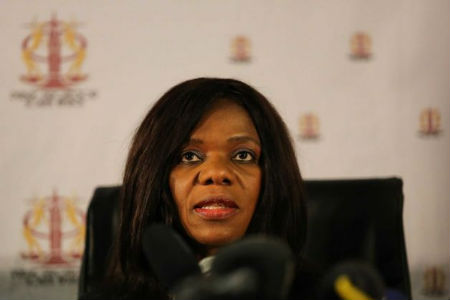
The head of South Africa’s state watchdog agency came to talk about a scandal surrounding costly state upgrades to the president’s private home, but she started with a summary of “Animal Farm,” George Orwell’s allegorical novel about oppression, revolution and corruption.
“We’re not in `Animal Farm’ in South Africa,” Public Protector Thuli Madonsela said with a smile in a packed auditorium at the University of the Witwatersrand on Thursday, a day after releasing a 450-page report that concluded President Jacob Zuma had inappropriately benefited from state funding and should pay back some money.
All the same, the literary introduction was a warning about power abuse from Madonsela, a former high school teacher and human rights lawyer who helped draft South Africa’s constitution after the end of white racist rule in 1994, and now stands at the center of a debate over corruption ahead of elections on May 7. The flashpoint of popular discontent is Zuma’s Nkandla residence, where more than $20 million was spent for alleged security upgrades that, according to Madonsela, were financially “excessive and obscene” and had nothing to do with security in some cases.
“Everything was done cowboy-style,” Madonsela said. She summarized the attitude of the managers of the Nkandla project as: `”If we need it, we will do it.'”
Her face framed by long hair, 51-year-old Madonsela often speaks with clasped hands. Her reserved, almost serene, demeanor belies what admirers say is an iron resolve to exercise the independence of her office, regardless of political pressure. A cartoon in Johannesburg’s Star newspaper portrayed her as a gunslinger with a sheriff’s badge at “High Noon,” with the caption: “The story of a woman who’s too brave to run!”
Madonsela’s detractors, however, accuse her of posturing in the media and pandering to a political opposition that hopes to gain ground in the May vote against the ruling African National Congress, which has dominated politics since South Africa’s first all-race elections in 1994. Already, several opposition parties have called for Zuma’s resignation as a result of Madonsela’s report, though the ruling party would likely block any impeachment attempt with its parliamentary majority. The youth league of the African National Congress said the public protector should resign, comparing her actions to that of a “kangaroo court” and saying she had “compromised herself to the bone.”
South Africa has an active civil society, a relatively stable electoral system and the biggest economy on the continent, but entrenched poverty, crime and corruption are constant concerns. Many South Africans were shocked at media reports, since confirmed in Madonsela’s report, that “security” upgrades to Zuma’s rural home in KwaZulu-Natal province included a swimming pool, an amphitheater, a visitors’ center, a clinic, a chicken run and an area for cattle. Construction was partly paid for with funds from inner-city development programs and some neighbors had to be relocated.
“In summary, government failed in complying with the principles – public power should always be exercised within the confines of the law” and in the public interest, said Madonsela, who worked in the trade union movement during the anti-apartheid struggle in the 1980s. She said the president was mistaken – but did not lie – when he told parliament that the government had not constructed any buildings or houses for him, noting: “He seemed to think that buildings and houses are only the ones that you sleep in.”
Zuma, who appointed Madonsela to a seven-year term in 2009, has said he respects her office and will study her report. Madonsela interviewed the president during her investigation, recalling he said he wanted her to act according to the law.
Retired Archbishop Desmond Tutu praised Madonsela for investigating “without fear or favor” and said allegations that she timed the report’s release to influence the election were “scandalous nonsense.”
Madonsela, who was embarrassed when her son crashed her official vehicle early one morning in 2012, said she should be as subject to scrutiny as anyone else. Her office has issued reports critical of the fisheries minister, an executive at the state broadcaster, SABC, and the head of South Africa’s electoral commission.
“We work in a cowardly way,” she said, noting that she and her staff of 300 could be sued. “We don’t want to do anything we can’t explain. We try to stick with the law and with the facts.”
At the University of Witwatersrand, where she once studied, Madonsela invoked a line from Orwell’s work – “All animals are equal but some animals are more equal than others” – as a warning against creeping injustice. She had another message, too.
“We get the society we deserve. We create the societies we live in,” Madonsela said. “We can’t point fingers at anyone and say they are responsible for our fate.”


